Are Mushroom Coffees Really Good for You?
Mushroom coffee is the latest darling of the wellness world—offering promises of sharper focus, a stronger immune system, and a gentler caffeine kick. But is this trend backed by science or just the latest brew of hype?
Let’s dive into the facts (and fungi).
What Is Mushroom Coffee, Anyway?
Mushroom coffee typically combines ground coffee beans with powdered extracts of medicinal mushrooms like:
- Lion’s Mane – linked to cognitive health
- Chaga – packed with antioxidants
- Reishi – used for immune and stress support
- Cordyceps – may help energy and endurance
- Turkey Tail – studied for gut and immune function

Lion’s Mane
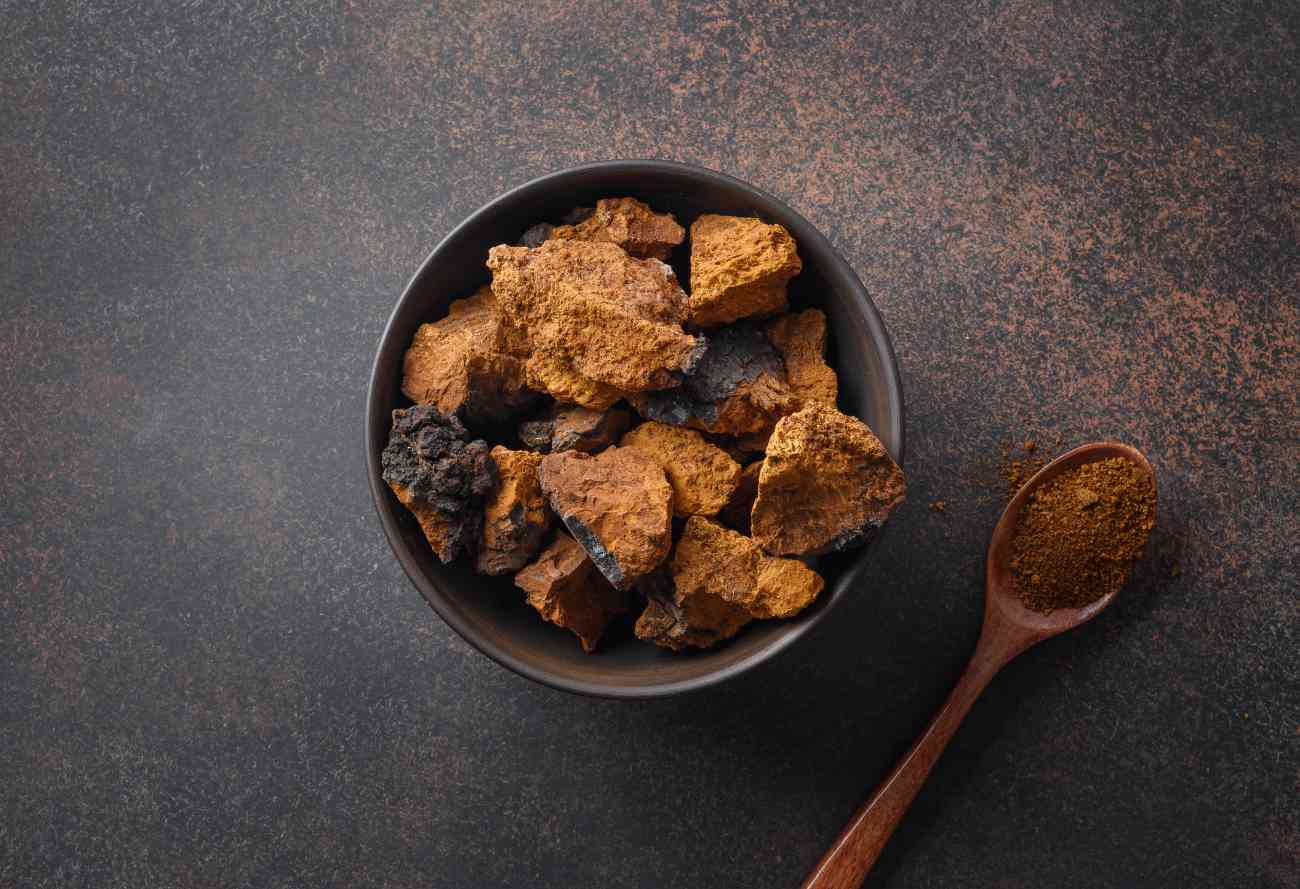
Chaga
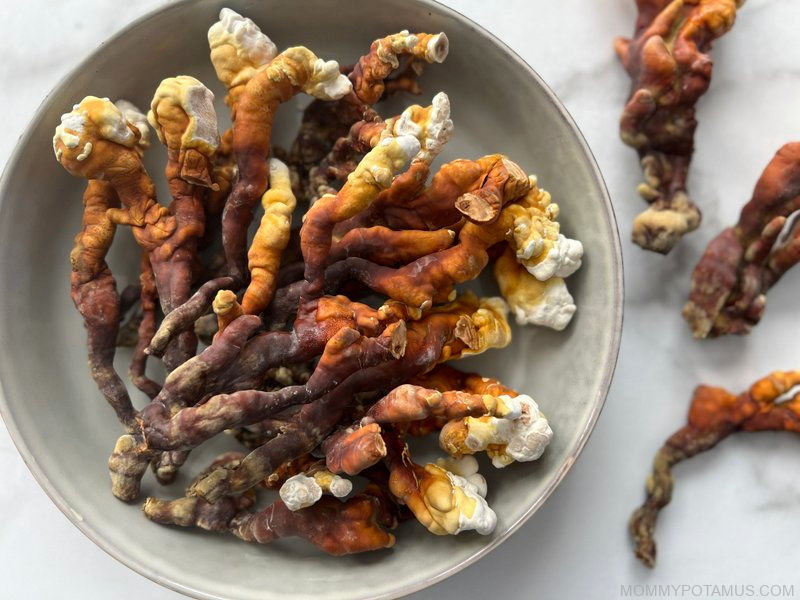
Reishi
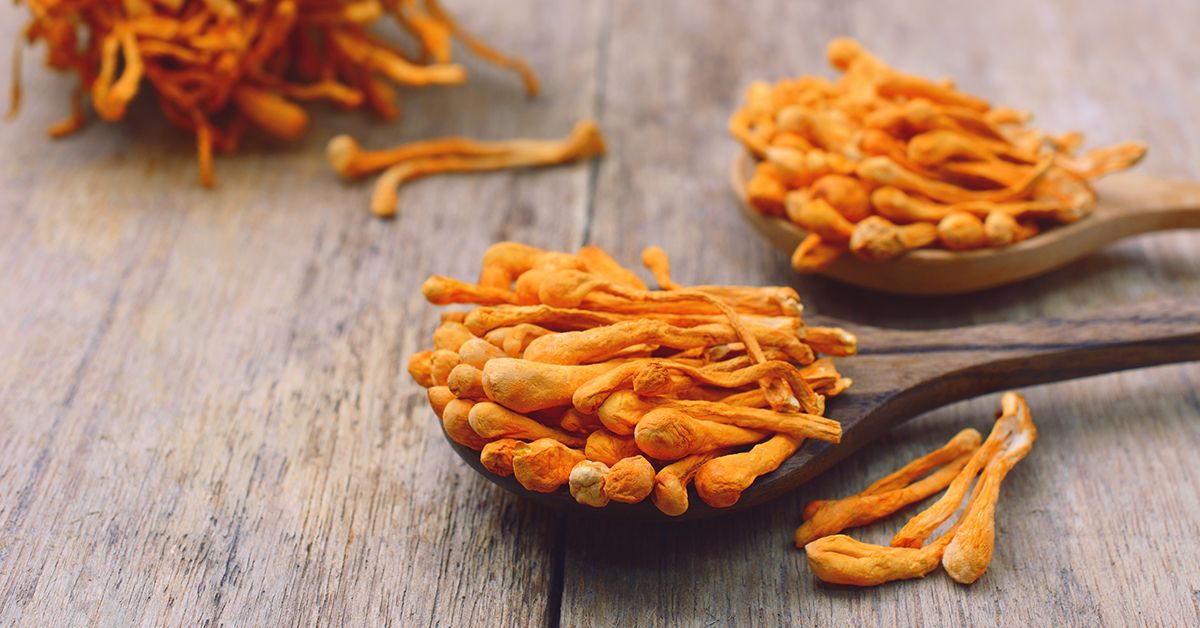
Cordyceps
Turkey Tail
These aren’t your typical mushrooms for stir fry—they’re adaptogens used in traditional medicine. The end result? A dark, earthy brew with fewer jitters and potentially more benefits.
The Claimed Benefits—Let’s Break Them Down

☕ 1. Immune System Support
Chaga, turkey tail, and reishi mushrooms are rich in compounds like beta-glucans and antioxidants. These may help support immune defenses and protect cells from oxidative damage.
☕ 2. Stress Reduction & Inflammation Control
Adaptogens like reishi and cordyceps may help your body adapt to stress. Limited studies suggest these mushrooms can reduce inflammation and potentially regulate cortisol levels.
☕ 3. Brain Boosting Effects
Lion’s Mane is the go-to for mental clarity. It’s been shown in small human trials to promote nerve growth factor (NGF), which may support focus, memory, and mood.
Note: Most studies use high-dose lion’s mane supplements—not coffee blends.
☕ 4. Gentler Caffeine Hit
Because mushroom coffee usually blends coffee with non-caffeinated mushroom powder, it often contains half the caffeine of a regular cup. Great for people sensitive to stimulants.
☕ 5. Antioxidants & Other Wellness Claims
Cordycepin (found in cordyceps), polyphenols, and other mushroom compounds may offer heart and metabolic health benefits—but again, evidence is early.
What Does the Science Say?
- ✔️ Early promise: Mushroom extracts show potential in animal and lab studies.
- ⚠️ Weak evidence for benefits in brewed drinks. Most studies use high-dose supplements, not instant mixes.
- ❗ Lack of standardization across brands makes it hard to know what dose you’re actually getting.
Bottom line: mushroom coffee isn’t snake oil—but it’s not a miracle drink either.
Real Talk: Dosage, Safety & Label Red Flags
Many mushroom coffee brands hide behind proprietary blends, leaving you guessing how much of each mushroom you’re actually consuming.
⚠️ Safety Tips:
- Safe for most healthy adults
- Avoid if you have mushroom allergies
- Consult your doctor if you’re on blood pressure or diabetes meds
Potential side effects: GI upset, skin rash, or headaches
So… Should You Drink It?
You might enjoy mushroom coffee if you:
- Want less caffeine but still crave coffee flavor
- Are exploring functional health supplements
- Prefer earthy, nutty flavor notes
But skip it if you:
- Expect it to solve all your health problems
- Are allergic to mushrooms
- Don’t enjoy the taste
Where to Buy & What to Try
Top Trusted Brands
- ✅ Four Sigmatic Mushroom Coffee One of the most trusted names in the space. This lion’s mane and chaga blend helps support focus and immune health. Balanced taste, smooth finish.
- ✅ Ryze Mushroom Coffee with MCT Oil A creamy, adaptogenic powerhouse. Includes six functional mushrooms and MCT oil for clean energy.
- ✅ MUD\WTR Mushroom Coffee Alternative Not your typical coffee—this caffeine-free blend features chai, cacao, and mushrooms. Great for evening routines.
- ✅ Laird Superfood Functional Coffee Crafted by pro athlete Laird Hamilton. This blend is bold, full-bodied, and includes functional mushrooms and minerals.
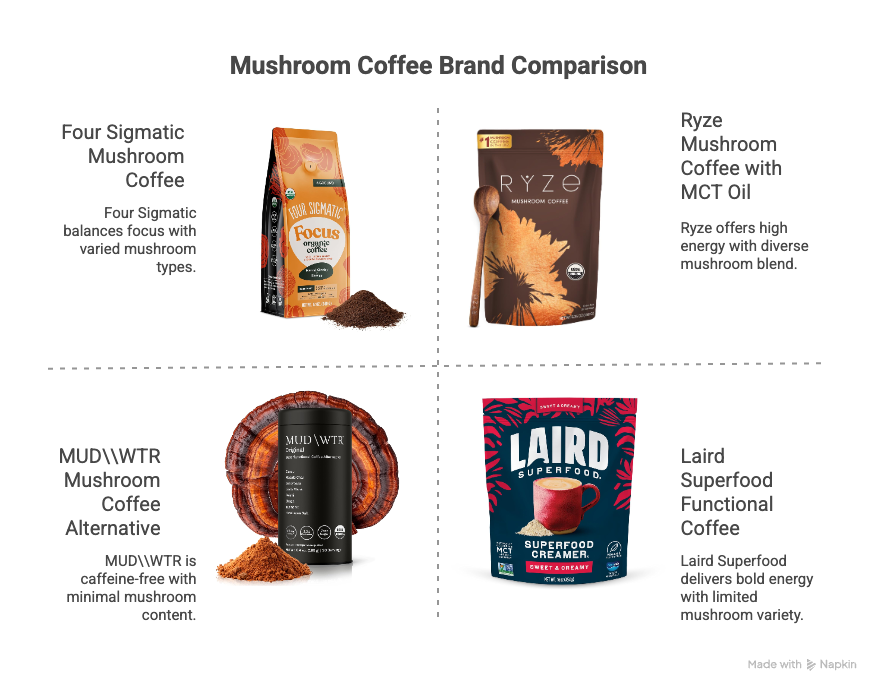
💸 Budget-Friendly Mushroom Coffee Alternatives
Not ready to spend top dollar? No problem. These wallet-friendly mushroom coffee blends offer many of the same adaptogenic ingredients—without the premium price tag.
- ✅ Suiyilary Mushroom Coffee 10 IN 110 Mushroom Extract Powder Blend Lion’s Mane, Reishi, Chaga, etc. Mixes easily into coffee, smoothies, or tea. Great bang for your buck.
- ✅ Yege Instant Organic Mushroom Coffee
Premium Mushroom and Coffee Blend: A unique combination of premium Arabica coffee beans and a blend of six adaptogenic mushrooms enriched with MCT oil and coconut milk. - ✅ NatureBell Organic Mushroom Coffee with MCT Oil
Organic 10-in-1 mushroom coffee, raw mushroom superfood complex with medium chain triglycerides (MCT).
Want the benefits without paying for big brand marketing? Here are some lesser-known blends that offer great value—often with similar ingredients and effects at a fraction of the price.
💡 Tip: Look for brands that disclose exact mushroom types and quantities. Transparency = trust.
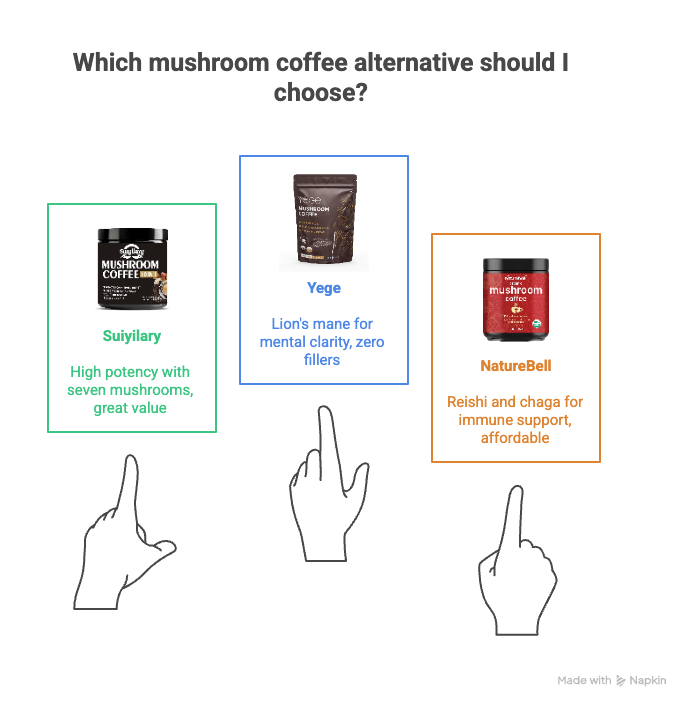
Bottom Line: Fungi or Faux Health Fix?
🍄 Verdict: Mushroom coffee is not a magic brew—but it’s also not a placebo in a cup.
TL;DR:
- ✅ Worth a try if you like earthy brews and want less caffeine
- 🔍 Read labels carefully—dose and transparency vary wildly
- ❌ Don’t rely on it as a cure-all
Drink it because you enjoy it. Benefit from it as a bonus.
FAQ: Mushroom Coffee Questions, Answered
Who should not drink mushroom coffee?
People with mushroom allergies, those on blood pressure or diabetes medications, and anyone pregnant or breastfeeding should consult a healthcare provider before trying it.
What is the healthiest mushroom coffee to buy?
Four Sigmatic and Ryze are among the best mushroom coffee brands due to transparent sourcing, high-quality mushrooms, and added functional ingredients like MCT oil or cacao.
Can drinking mushroom coffee raise your blood pressure?
Unlikely. Most mushroom coffees have less caffeine than regular coffee. However, those on hypertension medication should consult a doctor.
What does mushroom coffee taste like?
Earthy, nutty, and slightly bitter. Some blends taste like a mild dark roast, while others lean toward a tea-like or chocolatey profile depending on ingredients.
What are the side effects of mushroom powder?
Common side effects include digestive issues, headaches, or allergic reactions. These are rare but possible, especially in higher doses or sensitive individuals.
How often should you drink mushroom coffee?
1–2 cups per day is typical. Just like with regular coffee, moderation is key—especially if you’re combining it with other adaptogenic supplements.
Is Ryze mushroom coffee bad for you?
Not inherently. It contains functional mushrooms and MCT oil. But always check for ingredient sensitivity and monitor your body’s response.
Does mushroom coffee stain your teeth?
Like all coffee, it can cause minor staining over time. Good oral hygiene and the occasional whitening treatment can keep your smile bright.
Does Ryze mushroom coffee show up on a drug test?
No. Functional mushrooms like cordyceps or reishi do not contain substances flagged on standard drug tests.
Can you mix mushroom coffee with regular coffee?
Absolutely. Many people use it as a half-caff substitute, blending it with traditional beans for a gentler energy boost.

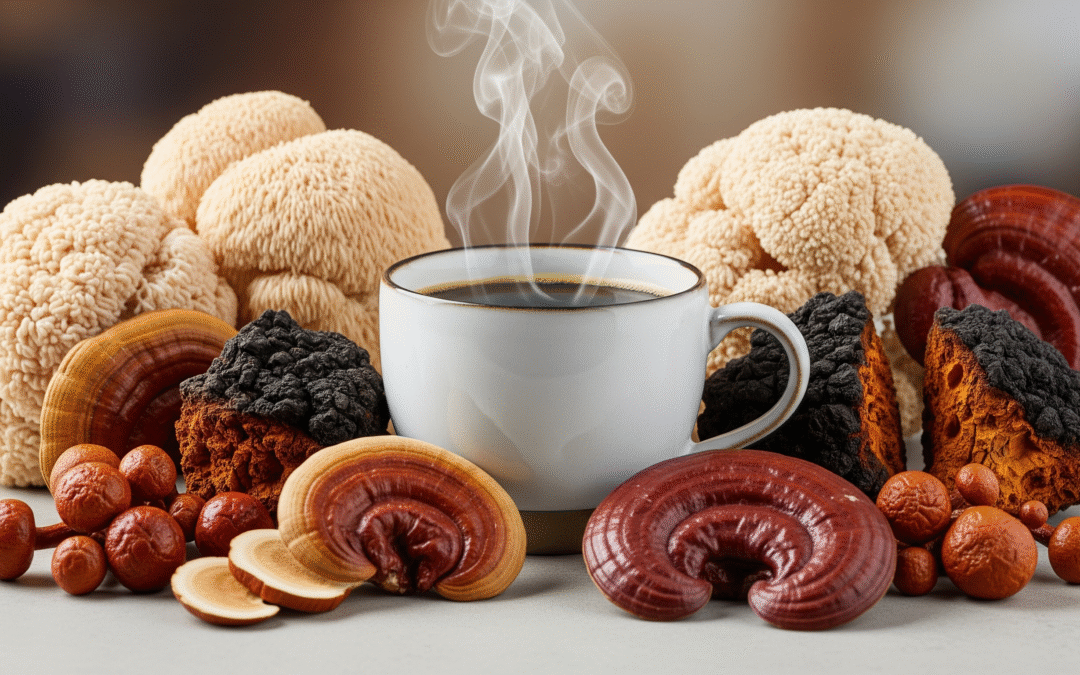

Recent Comments